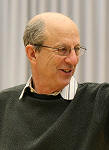Questions? Call us
toll free:
1-800-856-3060

Interview with the Translator
Richer Resources: You
have been involved in the dramatic arts for a very long time. How and
when did you first become interested in the area of drama?
Robert Cohen: I grew up in Washington, DC, and my
parents took me to the musical, Oklahoma! in the early 1950s, and then
dramatic plays including "The Caine Mutiny Courtmartial" with Henry Fonda,
"Mrs. McThing" with Helen Hayes, and "The Lark" with Julie Andrews. Then I
started going to New York - and even though Iíve lived in California for
the last fifty years, I never stopped! While it never occurred to me to
go into theatre as a career until my senior year in college, I certainly
fell in love with it from the audience! It was not until I was a senior,
however, and preparing to go to Law School, that I suddenly decided to
switch into becoming a drama teacher and a play director. And so instead
of applying to Harvard Law School, I made an application to the Yale
Drama School, and I took it from there. The writing of books and plays
and theatre reviews followed thereafter.
Richer Resources: What do you most love about the
theater?
Robert Cohen: Everything: that it is about ideas, that
it is a visual and poetic art, that it includes music and speaking and
costumes and scenery, and that, above all, it is about people, watched
by people and performed by people who are right in front of them,
laughing and crying. It is a HUMAN artófrom beginning to end.
Richer Resources: Most of your other books seem to be
about the art and skill of acting and the theater itself Ė what prompted
you to translate Clizia?
Robert Cohen: Well, I have also written several plays and one
of them is about NiccolÚ Machiavelli (originally titled The Prince
(Dramatic Publishing Company) and subsequently Machiavelli: the art
of terror), which is currently in the active repertoire of the
National Theatre of Romania in Cluj-Napoca, and has been presented in
several cities around the United States and abroad. Part of that play
includes a brief scene from Machiavelliís Clizia. After
translating a page or two from it to use in my play, I decided to
translate the entire play, which we produced as an ďafterplayĒ for those
who wanted to stick around (at 11pm) and see it. Thatís where it stood
until you wrote offering to publish itófor which I am enormously
grateful.
Richer Resources: What do you find most rewarding about
acting? About directing? About translating classic works?
Robert Cohen: Iíve always enjoyed the process of
writing, directing and translating. I translated two operas that I had
been commissioned to direct, Magic Flute and Carmen,
even though they already had good translations I could have used for
free. I simply loved creating the emotions and ideas of the play, and
the (absolutely required) rhymes, syllable and stress structures, and
singable notes of the stanzas. The only area of theatre I rarely enjoyed
was acting: I love teaching it to others, and writing about it for my
students, but I donít like ďteaching myselfĒ while Iím onstageóas itís
the opposite of what I ask my students to do. I havenít acted in a play
since the 1970s.
Richer Resources: Do you have a favorite play?
Robert Cohen: Every director I know has the same answer
to this question: Itís ďthe play Iím now doing."
Richer Resources: What do you feel is the value of
dramatic classics to modern day understandings? In other words, how are
classics relevant to today's reader?
Robert Cohen: In every way. First, because they
are great plays, and they show that even a 400 year old playóor even a
2500 year old oneócan make audiences laugh, cry, and learn valuable
realities of their daily livesóand how to deal with them. And second,
because they provide us with a panorama of human history, and what
people thought at the time the plays were written. Of the more-than-one
hundred plays Iíve directed, Iíve done no more than two by any
playwright I can think of but Iíve staged seventeen Shakespeares, three of
them multiple times.
Richer Resources: Thank you very much for granting this interview,
Professor Cohen.
Robert Cohen: My pleasure!
At Richer Resources, we are dedicated to the creation of high quality books, art and other media intended to enrich the lives of individuals of all ages.
As an independent publisher, we are bound by a sense of integrity and quality to produce products which enhance the lives and vision of individuals everywhere.
Sign up to receive notice of free eBooks, new releases and special subscriber-only offers.
(You can unsubscribe at any time)